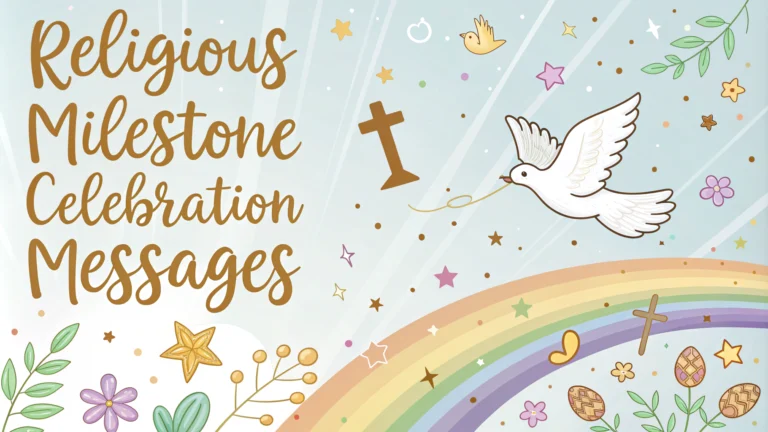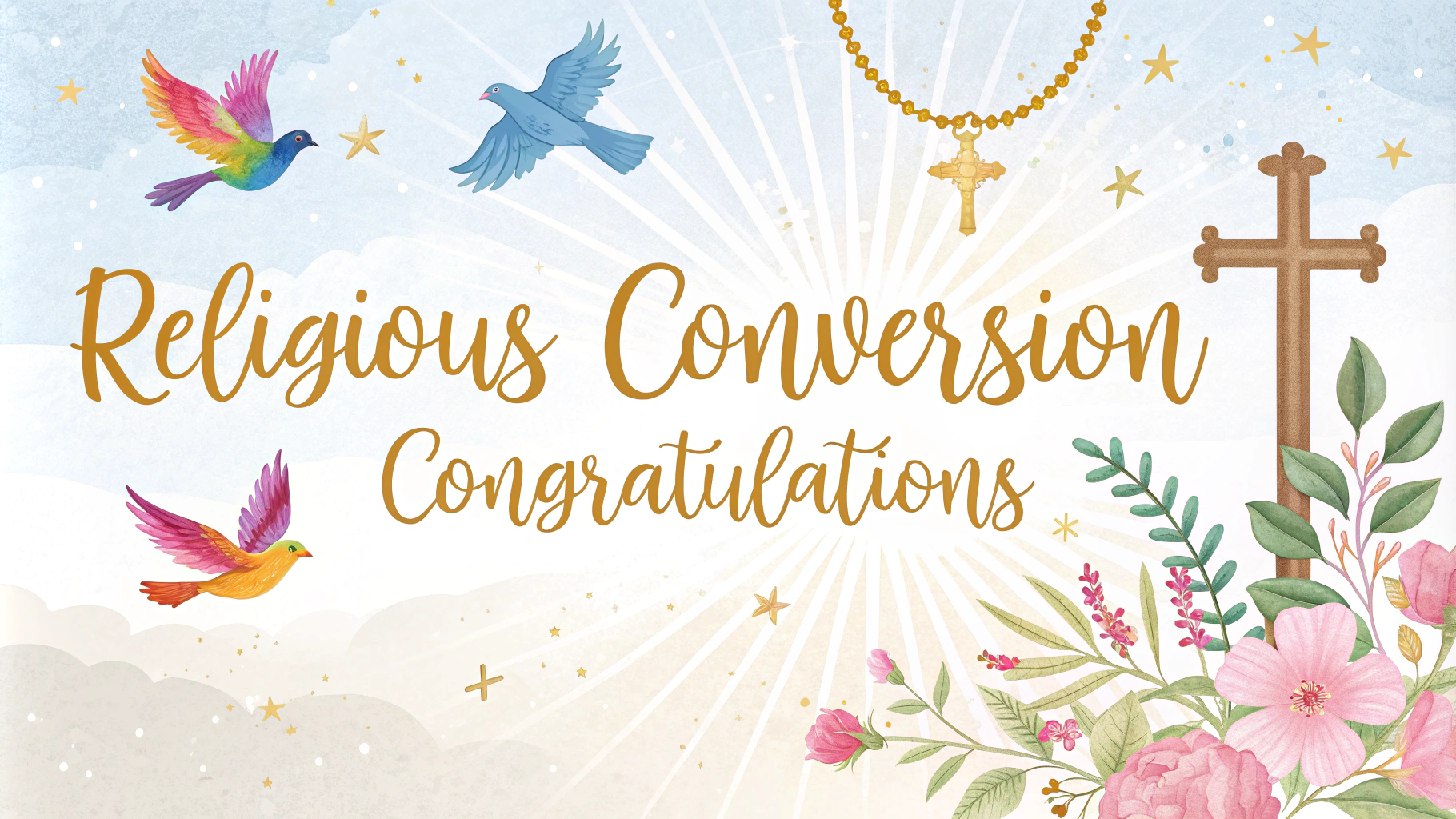Religious milestone celebrations mark significant moments in a person’s spiritual journey, from baptisms and confirmations to bar mitzvahs and first communions.
Common Religious Milestones
- Christianity:
- Baptism
- First Communion
- Confirmation
- Religious Wedding
- Judaism:
- Bar Mitzvah (boys)
- Bat Mitzvah (girls)
- Brit Milah (circumcision)
- Islam:
- Aqiqah (birth celebration)
- Bismillah (beginning Quran study)
- Ameen (completing Quran reading)
Writing Meaningful Messages
A thoughtful religious milestone message should acknowledge both the spiritual significance and personal achievement of the celebrant.
Tips for Writing Religious Messages
- Research the specific religious tradition and its customs
- Use appropriate religious terminology
- Include relevant scripture verses or religious quotes
- Balance religious sentiment with personal warmth
- Consider the recipient’s level of religious observance
What to Avoid
- Mixing religious traditions or symbols
- Using overly casual language
- Making assumptions about religious beliefs
- Including inappropriate humor
Gift-Giving Guidelines
| Occasion | Traditional Gifts |
|---|---|
| Baptism | Silver items, religious jewelry, picture frames |
| Bar/Bat Mitzvah | Judaica items, savings bonds, educational gifts |
| Confirmation | Religious books, crosses, personalized Bibles |
Consider including a monetary gift in multiples of 18 for Jewish celebrations, as this number represents “chai” (life) in Hebrew.
Cultural Considerations
- Research specific cultural customs associated with the celebration
- Be mindful of dietary restrictions when planning celebration meals
- Respect dress codes and modesty requirements
- Consider timing around religious observances and holidays
Remember to follow appropriate etiquette for the specific house of worship where celebrations take place.
Planning the Celebration
- Venue Selection:
- Religious institution facilities
- Private party venues
- Home celebrations
- Timeline Planning:
- Coordinate with religious leaders
- Schedule around religious calendar
- Plan rehearsals if needed
Documentation and Keepsakes
- Professional photography guidelines
- Video recording permissions
- Guest book traditions
- Religious certificates
Special Considerations for Modern Celebrations
- Interfaith Families:
- Blending traditions respectfully
- Including both families’ customs
- Consulting religious leaders for guidance
- Virtual Participation:
- Livestreaming options
- Remote family inclusion
- Digital guest books
Conclusion
Religious milestone celebrations represent pivotal moments in spiritual development and community belonging. Success in commemorating these occasions lies in thoughtful planning, respect for traditions, and meaningful personal touches. Whether celebrating within a single faith tradition or navigating interfaith considerations, focus on the spiritual significance while creating lasting memories for all participants.
Remember these key points:
- Honor religious traditions and customs
- Personalize celebrations appropriately
- Include family and community
- Document the milestone respectfully
- Create meaningful keepsakes
FAQs
- What are some common religious milestone celebrations across different faiths?
Bar/Bat Mitzvah (Judaism), First Communion (Christianity), Confirmation (Christianity), Upanayana (Hinduism), Amrit Sanskar (Sikhism), and Shahada (Islam) are among the most celebrated religious milestones. - When is it appropriate to send religious milestone celebration messages?
Messages should be sent either shortly before, on the day of, or immediately after the celebration. For major celebrations, it’s acceptable to send wishes up to a week after the event. - How should I structure a religious milestone congratulatory message?
Begin with a warm congratulation, acknowledge the spiritual significance of the milestone, express joy for their achievement, and close with wishes for their continued spiritual journey. - What phrases should I avoid in religious milestone messages?
Avoid using phrases from other religions, making comparisons between faiths, using religious stereotypes, or including humor that might be considered disrespectful to the faith. - Should I send religious milestone messages if I practice a different faith?
Yes, it’s acceptable and often appreciated to send respectful congratulatory messages across faith boundaries, focusing on the celebrant’s joy and achievement rather than specific religious aspects. - What are appropriate gifts to accompany religious milestone messages?
Traditional religious items, books, jewelry with religious significance, monetary gifts in culturally appropriate amounts, or charitable donations in the celebrant’s name are suitable options. - How do I address religious leaders in milestone celebration messages?
Use proper religious titles such as Rabbi, Father, Imam, Pandit, or other appropriate honorifics when addressing religious leaders in your messages. - What colors are appropriate for religious milestone celebration cards?
Gold, white, and silver are universally acceptable. Some faiths have specific traditional colors: blue and white for Judaism, red for Chinese religious celebrations, and saffron for Hindu ceremonies. - How can I make religious milestone messages more personal?
Include specific memories shared with the celebrant, reference their spiritual journey, mention family traditions, or incorporate appropriate religious quotes meaningful to their faith. - Should religious milestone messages be formal or casual?
Messages should maintain a respectful tone while matching the relationship level – more formal for religious leaders or distant acquaintances, warmer and more personal for close friends and family.







